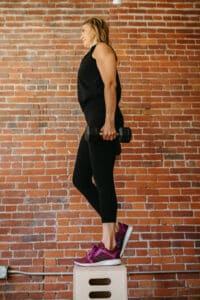
Even when we plan and prepare, life can shift unexpectedly.
Sometimes it’s an injury that disrupts your usual routine. Other times, it’s a busy work season, caring for family, or simply feeling too tired to train the way you used to. When movement is a stress reliever or something you enjoy, these changes can feel discouraging or confusing.
But just because life shifts, it doesn’t mean you have to stop moving. In fact, staying active in a way that fits your current season can support your body and mind while reducing stress.
You don’t need to throw out your entire movement and training plans when life changes. Often, all that’s needed is a gentle shift in how you approach it.
Here are 5 ways to stay consistent without overdoing it—or feeling guilty about missing sessions—when life changes:
If you’re returning after illness or injury, get medical clearance and ask about any movement restrictions. This helps you move safely and confidently.
If you’re simply in a busier season, set boundaries around what’s realistic. It might mean reducing session length or frequency, and that’s okay. Clarity helps you train consistently without burning out.
Instead of pushing through your usual routine, adjust your approach to match your current energy and capacity. When it comes to strength training, this might mean:
For example, you can replace heavy dumbbell work with bodyweight or band work. Or take a look at your busy week’s schedule and identify how long and how often your workouts should be for that week. Know what can be done realistically (e.g. 30 minutes instead of an hour, 2 days instead of 3 days) instead of doing nothing at all. Having workouts that meet you where you are, helps you stay active while respecting your limits and is key to resilient strength-building!
If time is tight, a shorter session is still valuable. If you’re exhausted, a mobility-focused day is progress. If one part of your body is injured, you can train other areas.
For example:
Resilient strength-building doesn’t require perfection; it’s about staying connected to movement and to yourself in a way that’s possible right now.
If strength training feels too heavy during this season, consider walking, yoga, swimming, or mobility work. These support circulation, mental health, and body awareness while allowing you to honor your energy.
Fun, low-impact movement can also refresh your relationship with exercise, reducing the “all or nothing” mindset that leads to guilt or burnout.
Life’s transitions—whether it’s healing from an injury, navigating exhaustion, or caring for others—are not the time to expect yourself to train exactly as before. Progress may feel as if it’s slowed, but really, every small step forward is progress.
If you miss a session (or several!), it doesn’t mean you’ve failed. If you need to adjust your plan, you’re not behind. Movement is here to support your life, not the other way around.
Lean on your support system, celebrate small wins, and be kind to yourself as you move through this season. This is how you build resilient strength—physically, mentally, and emotionally.
You don’t have to stop moving when life changes.
With the right mindset, and well-informed adjustments, you can continue to build strength that adapts with you—supporting your body, calming your mind, and helping you stay connected to yourself, no matter what season you’re in.
Reach out if you have any questions about moving when injured, busy or just exhausted. I have upcoming workshops, courses and also offer one-on-one in private yoga and strength and exercise sessions.

